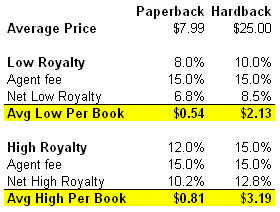You want to meet editors and agents. But how? Where?
Writing Excuses recently held a great podcast listing the types of events aspiring authors might want to attend–conventions, conferences, workshops, expos, etc. But knowing the types still doesn’t tell you which events to go to.
If you’re looking to meet editors and agents, here’s a way to figure out precisely which events you should attend.
1. Instead of taking a random scatter-shot approach, get some laser precision. Do this by first identifying the specific editors and agents you’re interested in. Then find out which events they’re going to attend. Forget all the other events–these are the ones you want to go to.
These folks will often post their schedule on their websites. The workshops, conferences, and conventions will also often post guest lists. You can also query the agency or publisher itself and ask which cons so-and-so will attend (just contact the receptionist, you don’t need or want to contact the editor or agent specifically).
Now even if you don’t know exactly who you’re interested in, you can still narrow down your focus. Event X might at least have some agents or editors attending (even if they’re not in your genre) while event Y does not. So go and see if you can’t get tips from those agents or editors
2. Research each of the events. Some provide meetings with editors, some provide pitch sessions, some will require you to track the person down. Select the events that look the most promising to you.
3. If you feel a bit nervous or shy, develop a short script for what you’ll say and how you’ll approach these folks. Or make a list of potential talking points. Run it by some friends and other writers to make sure you don’t sound robotic, dweebish, pushy, or pleading.
You have to remember that agents and editors are looking for new talent constantly. If they don’t find new talent, their income stream soon dies. They want and expect people to find them. They WANT to talk to YOU. They just want to be approached in a friendly and business like way.
So you have your script, talking points, and plans and will probably end up deviating from them. However, just having that in your head when you go to the con and approach the person you want to talk to (even if it’s only two sentences) can go a long way to calming your nerves.
4. Attend the con and make adjustments to your plan as necessary.
5. Don’t miss unplanned opportunities. Writing is sometimes a lonely business. When I go to cons I have folks I want to meet and catch up on. But I also make sure I engage other con goers. I smile, I say hello, I ask things like “so are you here as a writer or a fanboy?” or “what did you think about panel?” or “Your Klingon ridge is looking mighty today.” We chat.
I do it because I learn a lot from others and its just plain interesting. And sometimes you make an acquaintance that can develop into a working relationship. For example, I met Larry Correia (new author with Baen) at a local con I just attended. He had a fascinating story about his breaking in. We chatted for a while. There was no ulterior business/network motive. Just a great conversation. A month or so later a business opportunity arose and I thought of Larry. He’s now going on tour with me and Dave Farland this fall.
Be flexible. I’ve been invited and have invited others to go do lunch or dinner. And those have always been great chats. And sometimes business ops have arisen later because of them. But even if they hadn’t, it just makes the experience so much better. Good conversation is its own reward.
6. If all of this is too scary, bring back up. Get a friend or family member to go with you. 🙂
And if you stumble a bit, maybe stutter, maybe even feel like you’ve made a fool of yourself, do not stress. It’s to be expected the first few times. No big deal. Most poeple are shy and will either give you a break or be so worried themselves they won’t notice. With a few tries you’ll learn. If yo do make a fool of yourself, the good thing is that editors and agents meet so many people that your face will soon be forgotten, and you’ll be able to reboot and approach them next year with a clean slate (just remember to not wear the same belly dancing costume).
Of course, this doesn’t tell you what to do and not to do when approaching these folks. But as far as deciding where to go, this is one method that works.
—
Added 7/31/09
SFWA has some great articles on conventions and networking by Diana Rowland.
How to Network at a Convention
Networking 201: How to Work a Room















